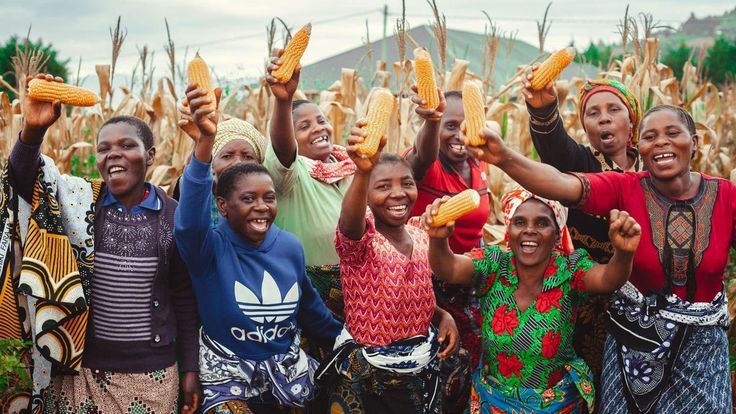
Regenerative Agriculture Empowers Rural Communities and Youth Regenerative agriculture is not just a farming method it’s a movement of hope. It’s about restoring life to the land and dignity to the people who depend on it. For many rural communities across Africa, it brings a fresh sense of possibility. For too long, farmers have been told that they need to buy expensive seeds, fertilizers, and chemicals to succeed. But regenerative agriculture offers another path one that says:
“You already have what you need your land, your knowledge, and your community.” Let’s look at how this movement is transforming rural lives and opening new doors for the next generation.
Ways in which Regenerative Agriculture Empowers Youths and Communities1.Growing Enough FoodWithout Costly Chemicals In many villages, farmers are struggling to grow enough food. Soils are tired. Rains come late or fall too hard and farm inputs are more expensive every season. But regenerative farming shows us that nature can heal itself if we farm with it, not against it. With practices like: Making compost from kitchen and animal waste. Planting cover crops like beans or cowpeas, Rotating crops each season, Using mulch to protect the soil farmers can improve soil fertility, increase harvests, and reduce the need for chemical fertilizers or pests.
2.Creating Local Green Jobs and IncomeRegenerative agriculture is also creating new job opportunities in villages not just for farmers, but for youth, women’s groups, and entrepreneurs. These are practical, meaningful jobs that protect the land while putting money in people’s pockets.
1.Compost businesses: Selling organic fertilizer to neighbor2.Tree nurseries: Raising seedlings for agroforestry
3.Beekeeping: Producing honey while boosting pollination
4.Local seed banks: Saving and sharing native seeds
5.Eco-tourism and demonstration farms: Teaching others, hosting farm tours, or selling organic products
These jobs don’t require big machines or large capital. Just a commitment to work with the land, not exploit it.
3. Inspiring Youth Through Innovation and PurposeIn many rural areas, young people are leaving farming behind. They see it as hard, outdated, and unprofitable. But regenerative agriculture is changing the story. This approach opens new doors for youth to:
- Use technology like mobile apps, weather sensors, or drones
- Create organic brands and sell produce in local or online markets- Launch agri-content on social media to teach others
- Join or start eco-businesses that restore land and generate income
It’s farming with purpose. Farming with pride. Farming with a future in mind.
4. Rebuilding Community, Tradition, and Hope
Regenerative farming revives not only the soil but also the spirit of community
- Farmers share knowledge and seeds again.
- Elders pass down traditional wisdom on land care.
- Youth return to their roots with new ideas and tools. - Families eat healthier food, grown right at home.
- Women’s groups find new ways to lead and earn.
In short, regenerative agriculture helps villages become more self-reliant, more united, and more hopeful. When a community heals its soil, it also heals itself.
We Believe:
Regenerative agriculture is a tool for transformation from poverty to possibility.
Every compost heap, every tree planted, every young farmer trained is a seed of hope.
Rural Africa can lead the way in climate-smart, life-giving agriculture not as a copy of the West, but through homegrown solutions.
Let’s grow that future together one seed, one farm, one youth at a time.
“You already have what you need your land, your knowledge, and your community.” Let’s look at how this movement is transforming rural lives and opening new doors for the next generation.
2.Creating Local Green Jobs and Income
3.Beekeeping: Producing honey while boosting pollination
4.Local seed banks: Saving and sharing native seeds
5.Eco-tourism and demonstration farms: Teaching others, hosting farm tours, or selling organic products
- Create organic brands and sell produce in local or online marketsThese jobs don’t require big machines or large capital. Just a commitment to work with the land, not exploit it.
3. Inspiring Youth Through Innovation and PurposeIn many rural areas, young people are leaving farming behind. They see it as hard, outdated, and unprofitable. But regenerative agriculture is changing the story. This approach opens new doors for youth to:
- Use technology like mobile apps, weather sensors, or drones
- Join or start eco-businesses that restore land and generate income
- Elders pass down traditional wisdom on land care.4. Rebuilding Community, Tradition, and Hope
Regenerative farming revives not only the soil but also the spirit of community
- Farmers share knowledge and seeds again.
- Youth return to their roots with new ideas and tools.
- Women’s groups find new ways to lead and earn.
We Believe:When a community heals its soil, it also heals itself.
Regenerative agriculture is a tool for transformation from poverty to possibility.
Every compost heap, every tree planted, every young farmer trained is a seed of hope.
Rural Africa can lead the way in climate-smart, life-giving agriculture not as a copy of the West, but through homegrown solutions.
Let’s grow that future together one seed, one farm, one youth at a time.
